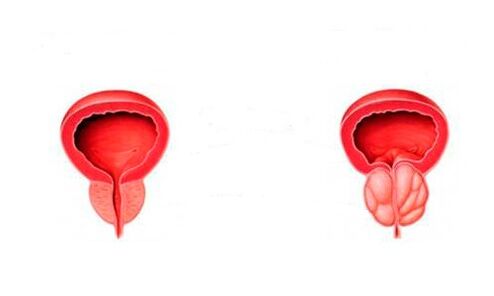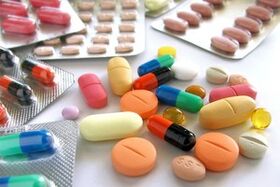Today, drugs for the treatment of prostatitis are by far the last in terms of the choice of drugs on offer. And not in vain: prostate diseases are the most common pathologies of the male reproductive system.

Prostatitis is an inflammatory process in the prostate.
Inflammation of this organ is most common:
- discomfort in the reproductive organs during or outside urination;
- pain during ejaculation (ejaculation);
- discomfort in the pelvic area and external genitalia.
All this leads to a decrease in activity and general well-being, emotional instability and psychological disorders. If you experience such symptoms, consult a specialist immediately.
A qualified urologist will perform the necessary diagnostic methods and help you cope with the disease.
Although it should be noted that the healing process may take some time, it is easier to cope with minor dysfunction of this organ than to initiate the irreversible developmental process of fatal consequences, including prostate cancer.
General provisions of therapy

As mentioned above, prostatitis is an inflammatory process and, like all inflammations, is most often caused by bacteria, so it is not surprising that anti-prostatitis drugs are primarily antibacterial agents (antibiotics).
The next step in the fight against the disease is non-steroidal anti-inflammatory drugs. They have a positive effect as they reduce edema in the prostate area by affecting the microcirculation of the organ. The goal of this treatment is to reduce venous congestion in the pelvis.
Another important point in the treatment of patients with diseases of the reproductive system is the reduction of pain syndrome. In most cases (especially in chronic or complicated forms of the disease), pain is the main complaint, so the doctor should help the patient as soon as possible to cope with the extremely unpleasant feelings of the external genitalia.
The final stage is to prevent the development of treatment complications and relapses in the future.

Here it is appropriate to prescribe drug correction of immunity, vitamin therapy, recommendations for improving health in general, which may include:
- low fat diet;
- moderate physical activity;
- stay in the fresh air;
- compliance with the basic rules of personal hygiene;
- rejection of bad habits (smoking, alcohol);
- a medical examination scheduled every six months.
By following these simple rules, you can not only avoid complications, but also prolong your sexual activity.
Step One: Pest Control
Specialists conditionally divide antibacterial drugs against prostatitis into three main groups: fluoroquinolones, tetracyclines and macrolides, and, less commonly, cephalosporins.
Fluoroquinolones are considered to be the most effective in treating diseases of this organ due to their many characteristics:
- affect most types of microorganisms that cause disorders of the urogenital system;
- accumulate in the tissues of the gland, which provides maximum effect on bacteria;
- practically does not cause immune deficiency after therapy;
- do not cause resistance (resistance of microbes to antibacterial drugs in this class).
Other prominent members of the group of antimicrobial agents for inflammation of this organ are tetracyclines and macrolides.
Long before the advent of their improved counterparts, fluoroquinolones, these drugs helped cope with bacterial disorders of prostate function. Over time, however, the microorganisms became more resistant to these two groups of drugs. In addition, these groups of drugs have a fairly long list of side effects and contraindications.
It should be noted that any antibacterial drug can cause spermatoxicity, which should be warned in advance. It is not recommended to use antibiotics at least four months before the planned pregnancy (full cycle of spermatogenesis).
Step Two: Reduce the swelling
Drugs for prostate disease that have a positive effect on microcirculation have proven successful in the modern therapy system for prostate disease. They contribute to the full supply of glandular tissues with medicinal compounds through the bloodstream, improve the outflow of secretions from the channels of this organ, increase the metabolic processes of cells, which usually helps the body cope with inflammation.
A distinction should be made between non-steroidal anti-inflammatory drugs (NSAIDs) among this group of drugs. The two drugs in the series are most commonly used:
- rectal suppositories - due to the local effect of the drug, the effect is relatively faster, which reduces the frequency and duration of administration;
- drops are taken. The course lasts twice as long as when using rectal suppositories. It is prescribed 4 drops 4 times daily before meals.
To help the patient
Drugs for the treatment of prostatitis, the main effects of which are immune correction and analgesia, are not specific. But they are still able to alleviate the patient’s fate and reduce the risk of re-inflammation.
To reduce the pain, your doctor may prescribe painkillers orally (orally) or rectally (suppositories and microclusters). However, taking the tablets has a relatively short-term effect, but is more comfortable to use.
Specific therapy
Recently, more and more effective drugs are being prescribed to treat prostatitis, which are narrow in the body. All combine and act in the tissues of the gland, acting in parallel on the cells of the organ, increasing their metabolism and the processes of restoring function.
Combination medications are convenient, but do not forget the generally accepted treatment regimen for prostatitis. It is best to consult a specialist about taking these medications.
Hormone therapy for the treatment of prostatitis
Increasingly, male sex hormone medications are prescribed as a general treatment regimen for the treatment of prostatitis. But it is important to note that they should be taken very carefully and make sure they are necessary for the patient before appointment.
Patients with this disease have noticed for a long time that their sex lives are deteriorating. Among other things, such patients experience depression and apathy in the background of their sexual inferiority. Hormone therapy helps to cope with sexual disorders and improves a person’s general condition.
Whatever medication your urologist recommends for recovery, remember that the key to treating any disease is strict adherence to your doctor’s instructions and prescriptions, early diagnosis, and maintaining good health.
And regardless of the likelihood of relapse, don’t neglect prevention. Preventing disease is better than curing it.































